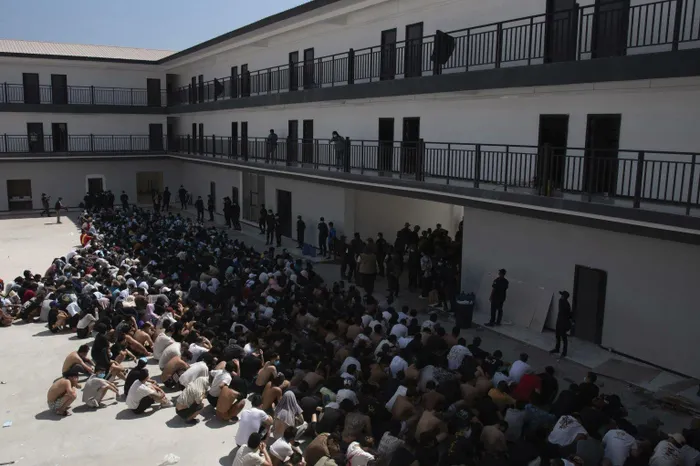How Asian cyber scam centres are expanding their global reach

23 South Africans who fell victim to human trafficking in Myanmar arrived home. DIRCO through the South African Embassy in Thailand, with the support of other departments and agencies, managed the complex process. Timing was everything in the rescue as the survivors touched down less than a day before Myanmar was struck by 2 earthquakes.
Image: DIRCO
A report from the UN Office on Drugs and Crime (UNODC) has warned that the Asian criminal networks running cyber scam centres are now broadening their operations as they target new victims around the world.
Crime groups in Asia have emerged as global market leaders in cyber-enabled fraud, money laundering and underground banking, and are now expanding operations in South America, Africa, the Middle East, Europe and some Pacific islands.
These include online services such as cryptocurrency, dating, investment and other scams.
According to the report, titled 'Inflection Point: Global Implications of Scam Centres, Underground Banking and Illicit Online Marketplace in Southeast Asia', the syndicates are raking in tens of billions of dollars a year.
These groups have also developed robust multi-lingual workforces comprised of hundreds of thousands of trafficked victims and complicit individuals.
This is driven by sophisticated transnational syndicates and interconnected networks of money launderers, human traffickers, and data brokers, as well as a growing number of other specialist service providers and facilitators.
This was observed in Myanmar, which shares borders with China, Laos, Thailand, India and Bangladesh.
The report stated that the dispersal of these criminal networks within areas of the weakest governance has attracted new players, fuelled corruption, and enabled the industry to continue to scale, culminating in hundreds of large-scale scam operations conservatively generating tens of billions of dollars in annual profits.
In the US, according to the report, authorities reported more than $5.6 billion in financial losses to cryptocurrency scams in 2023, with an estimated $4.4bn attributed to the so-called “pig butchering” schemes most prevalent in Southeast Asia.
Regionally, countries in East and Southeast Asia combined have lost up to an estimated $37bn to cyber-enable fraud during the same year.
The UNODC said the groups infiltrated venues and businesses including casinos, special economic zones, business parks, and various traditional financial and virtual asset services that have proven to offer all of the conditions, infrastructure, and regulatory, legal, and fiscal covers required for sustained growth and expansion.
“Recent trends and incidents in countries outside of Southeast Asia are taking place where awareness and understanding of emerging threats, crime types, modus operandi, and technologies leveraged by Asian criminal groups is low, leaving many jurisdictions vulnerable and underprepared.
"More developed countries with a more robust capacity to address transnational crime have also proven susceptible and exposed to the ability of Asian criminal networks to infiltrate these jurisdictions by targeting gaps in anti-money laundering and due diligence frameworks, and utilising complex shell structures and vast, increasingly digital underground banking systems to obscure the origins of their wealth and shift value across borders undetected,” reads the report.
The report stated that this has culminated in several large overseas raiders and crackdowns targeting scam centres with major networks in Southeast Asia over the years. This includes those found operating in Africa, the Middle East, South Asia and selected Pacific islands, as well as related laundering, trafficking in persons and recruitment services as far as Europe, North America and South America.
“The subtle and ongoing spillover creeping into other regions has allowed Asian crime syndicates to broaden the scope of their operations and target an increasingly diverse range of victim profiles and nationalities from around the world.”
“More than this, it has allowed them to dramatically scale up profits and influence while simultaneously generating billions in illicit capital reserves (fiat and cryptocurrency) that can be reinvested into further expansion and also utilised to service the money laundering needs of other criminal groups globally.”
Crime expert at the Institute for Security Studies (ISS), Willem Els, agreed with the contents of the report, saying it came from the recent event where 23 South Africans were rescued in Myanmar from a massive human trafficking ring last month. The 23 formed part of 7000 other individuals from various countries, including Namibia, Kenya and other countries.
Els said the victims were lured under the pretense that there were lucrative job opportunities only to be forced to perpetrate all these crimes.
In Africa, Nigeria has become a hot spot, with police raids in late 2024 and early 2025 leading to many arrests, including people from East and Southeast Asia suspected of cryptocurrency and romance scams. Zambia and Angola have also busted Asian-linked cyberfraud operations.
Cape Times
Related Topics: